
Malayalam cinema is the segment of Indian cinema dedicated to the production of motion pictures in the Malayalam language, which is widely spoken in the state of Kerala. Malayalam cinema includes the commercial film industry, sometimes known as Mollywood, as well as independent cinema made in Malayalam.
Palattu Koman is a 1962 Indian Malayalam-language film. The story of the film is based on the life of Palattu Koman, a pioneer of the Indian martial art form Kalaripayattu. The film was directed by Kunchacko (1912–1976) and produced by Geetha Salam. Sathyan, S. P. Pillai, Rushyendramani and Bahadoor were in the leading cast. The music director, Baburaj, wrote a critically acclaimed soundtrack that included the number "Poove Nalla Poove" sung by Santha P. Nair and penned by Vayalar Ramavarma. Palattu Koman, produced by Udaya Studios under the banner of Excel Productions Productions, and directed by Kunchacko, was an adaptation of a ballad from the Vadakkan Paatu. Following the grand success of the screen adaptation of a similar ballad, Unniyarcha (1961), the producers picked up another such ballad for Palattu Koman.

Maliampurackal Chacko Kunchacko was an Indian film producer and director who worked in the Malayalam film industry. His venture Udaya Studios influenced the gradual shift of Malayalam film industry from its original base of Madras, Tamil Nadu to Kerala. He is the producer of Jeevithanauka (1951), starring Thikkurissy Sukumaran Nair.

Venkateswaran Dakshinamoorthy was a veteran carnatic musician and composer and music director of Malayalam, Tamil and Hindi films. His work was predominantly in Malayalam cinema.

Miss Kumari (1932–1969) was an Indian actress working in the Malayalam film industry between 1949 and 1969. In the '50s and early '60s she was the most prominent female lead in the Malayalam film industry. She briefly worked as a teacher before she made her film debut in the 1949 film Vellinakshatram. She took on the stage name Miss Kumari on the sets of her second film, Nalla Thanka.
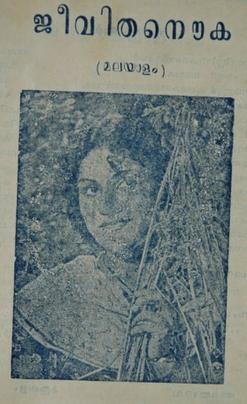
Jeevitha Nouka is a 1951 Malayalam-language film directed by K. Vembu and jointly produced by K. V. Koshi and Kunchako. It was the first "blockbuster cinema" in Malayalam cinema, with a theatrical run of 284 days. Made at a budget of ₹20,000, it was a commercial success at the box office, such that very few cinemas could surpass it later. It was simultaneously shot in Tamil and Telugu, and was dubbed and released in Hindi. This cinema portrayed the life of simple folk in a small village in Kerala. It stars Thikkurissy Sukumaran Nair and B. S. Saroja, with the latter making her debut and the former in his first major role. Its music is composed by V. Dakshinamoorthy and popular playback singer Mehboob debuted through this cinema. It is a remake of the Hindi cinema Jeevan Naiya with revised screenplay.
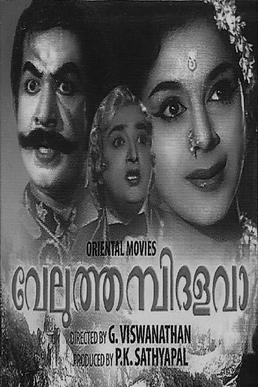
Veluthampi Dalawa is a 1962 Malayalam-language historical drama film based on the life of Velu Thampi Dalawa, the Dewan of Travancore during the first decade of 19th century, was one of the first to rebel against the British East India Company's supremacy. The film, directed by G. Viswanath and written by Jagathy N. K. Achary was shot in Newton Studios. Kottarakkara Sreedharan Nair, Thikkurissy Sukumaran Nair, Prem Nawas, Adoor Bhasi, G. K. Pillai, Ragini, Ambika Sukumaran and Sukumari portrayed prominent roles. The dances were choreographed by Chinni and Sampath along with Kalamandalam Madhavan. The film was a box office success.

Viyarppinte Vila is a 1962 Indian Malayalam-language film, directed by M. Krishnan Nair and produced by T. E. Vasudevan. The film stars Sathyan, Adoor Bhasi, Thikkurissy Sukumaran Nair and Kedamangalam Sadanandan in lead roles. The film had musical score by V. Dakshinamoorthy.
Velliyazhcha is a 1969 Indian Malayalam film, Vellikizhamai (Friday) story written in Tamil by Swathi and translated in Malayalam by S. L. Puram Sadandan, directed by M. M. Nesan and Swathi Ranga Chary and produced by Solar Pictures owned by Swathi family. The film stars Sathyan, Madhu, Sharada and Muthukulam Raghavan Pillai in the lead roles. The film had musical score and songs composed by M. S. Baburaj. It marked the debut of Malayalam cinema's music director Raveendran as a singer.
Udaya Studios was one of the oldest film studios in the Malayalam film industry of India. It was established in 1947 by director-producer Kunchacko (1912–1976) and film distributor K. V. Koshy in Pathirappally, Alappuzha in Kerala. The studio influenced the gradual shift of Malayalam film industry from its original base of Chennai, Tamil Nadu to Thiruvananthapuram, Kerala, now considered a milestone in the history of Malayalam film industry. The first film of the studio was Vellinakshatram (1949).

Vellinakshatram is a 1949 Indian Malayalam-language drama film written and directed by Felix J. H. Baez, who also handled special effects. It was produced by Kunchacko and K. V. Koshy in their debut production. The film stars Gayaka Peethambaram, P. Lalitha Devi, Alleppey Vincent, K. Ramakrishna Pillai, Kandiyoor Parameshwarankutty, Joseph Mulavana, and P. A. Ambujam. It was the debut film produced at Udaya Studios, the acting debut of Miss Kumari, and the debut of K. D. George as film editor. Its music was composed by B. A. Chidambaranath, who debuted with this film.
Merryland Studio is an Indian film studio based in Thiruvananthapuram, Kerala. It was the second film studio in Kerala, established in 1950 by former Thiruvananthapuram mayor and businessman P. Subramaniam. He produced 70 films, 59 of them directed by himself. He was active between 1951 – 1979. The studio's home productions were made under the company Neela Productions. Merryland Studio was famous for their professional rivalry with Kunchacko's Udaya Studio, the first film studio in Kerala. They resumed film production under the newly christened company Merryland Cinemas, debuting with Hridayam (2022).

S. P. Pillai was an Indian film and stage actor, best known for his comic roles in Malayalam films.
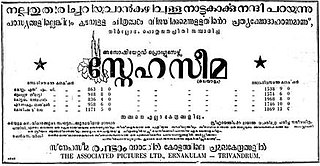
Snehaseema is a 1954 Malayalam film, directed by S. S. Rajan and written by Ponkunnam Varkey based on his own novel of the same name, which is a retelling of L. A. Tennyson's Enoch Arden in the context of Kerala culture. The lead roles were played by Sathyan, Padmini, G. K. Pillai, Muthukulam Raghavan Pillai, S. P. Pillai, P. J. Cheriyan, Baby Lalitha and Kottarakkara Sreedharan Nair. It received a certificate of merit at the 1st National Film Awards.
T. R. Omana is an Indian actress in Malayalam films. She mainly acts in supporting roles and mother roles. She has acted in more than 500 films.
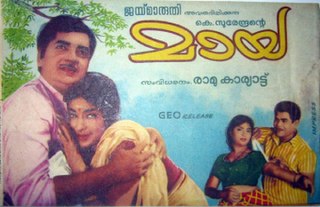
Maaya is a 1972 Indian Malayalam-language film, directed by Ramu Kariat for Jaya Maruthi, starring Thikkurissy Sukumaran Nair in the lead role. Prem Nazir and Sharada also play pivotal roles, supported by Vijayasree, Sujatha, Sankaradi and T. R. Omana playing other important roles. The film was based on an award-winning 1963 novel with the same name by popular novelist K. Surendran.

Avan Varunnu is a 1954 Indian Malayalam-language film, directed by M. R. S. Mani and produced by M. Kunchacko. The film stars Prem Nazir and Kumari Thankam. The film had musical score by V. Dakshinamoorthy.

Puthradharmam is a 1954 Indian Malayalam-language film, directed by Vimalkumar and produced by K. V. Koshy. The film stars Anilkumar and T. R. Omana. Its musical score was penned by P. S. Divakar.
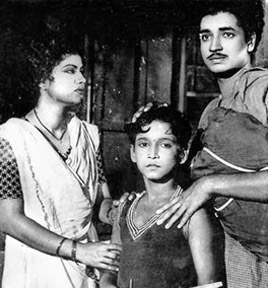
Kidappadam is a 1955 Indian Malayalam-language film, directed by M. R. S. Mani and produced by M. Kunchacko. The film stars Prem Nazir and Kumari Thankam. The film had musical score by V. Dakshinamoorthy. The popular song "Kunkuma Chaaraninju" is from this movie.
Ezhuthatha Kadha is a 1970 Indian Malayalam-language film, directed by A. B. Raj and produced by T. E. Vasudevan. The film stars Prem Nazir, Sheela, Adoor Bhasi and Muthukulam Raghavan Pillai. The film had musical score by V. Dakshinamoorthy.














